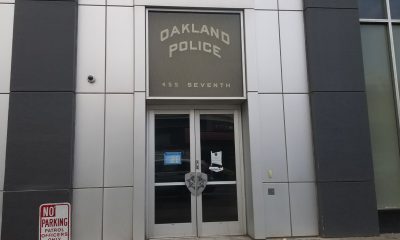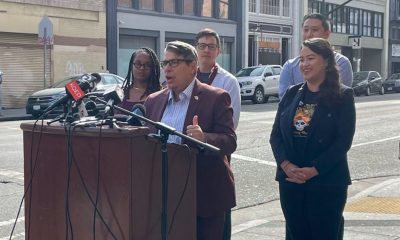City Government
Community Members Win Police Accountability Victory
After struggling for two years to overcome city staff resistance to carrying out a council-approved reform of intake of complaints against police, PUEBLO and other community organizations finally may be seeing light at the end of the tunnel.
At the Public Safety Committee meeting this week, it was announced that the civilian complaint intake workers would be hired by mid November.
Supporters of the City Council decision to put intake of all police complaints into the hands of the Civilian Police Review Board (CPRB) have been continually frustrated by what they have seen as City Administrator Deanna Santana’s actions that “at first delayed and then thwarted and subverted” the decision to hire, train and place intake workers at the office of the CPRB, located at Frank Ogawa Plaza.
This past Monday morning they took their demand to Mayor Jean Quan, Santana’s boss, who up until had refused to take a stand on the issue or set date to meet with them.
A delegation of about 15 people, carrying picket signs, went to Quan’s City Hall office, determined to sit there until she talked to them. One of the signs read, “Quan Keep Your Promise.”
They found the door to the office waiting locked. A staff member inside said through the door that the group could continue standing outside in the hallway if they were peaceful.
Otherwise, the police would be called. All staff were involved in meetings and could not meet with the group, the voice in the office said.
However, Anne Campbell Washington, the mayor’s chief of staff, met with four members of the group, who explained their concerns. Finally, they were told mayor would meet with them, Tuesday, July 30.
Fresh from that victory, PUEBLO and other community attended Tuesday evening’s Public Safety Committee meeting, where they announced they had received support for their position from both Thomas Frazier, Thelton Henderson’s compliance officer over OPD, and Mayor Quan.
“Now it’s clear that there is consensus about the direction. The mayor fully supports that the new intake personnel will reside with the CPRB,” said Rashidah Grinage, executive director of PUEBLO, who also handed out a copy of an email from federal Monitor Robert Warshaw that said he and Frazier had no objections to moving complaint intake to CPRB.
Grinage told the Post she had learned about the mayor’s position earlier Tuesday in a conversation with Campbell Washington.
Presenting her report at the meeting, Santana finally gave a timetable for hiring civilian intake workers. She said the process will be completed by Nov. 15
Santana did not refer to her position, stated an earlier Public Safety meeting, that training of intake workers would take up to 18 months and will be conducted by and at OPD’s Internal Affairs Division. After training is completed, the civilian workers might continue to be located at OPD, she said.
Public speakers were enthusiastic about the announced timetable but remained concerned about Santana’s proposals for training and housing the new workers.
“It is absolutely imperative that the civilians who are hired not be placed temporarily or otherwise within the police department. If you do that, there is no need to make any of these changes,” said community member Claudia Kong.
“I urge you to listen to the public will,” said Kim Mejia-Cuellar, a Yale student and graduate of Fremont High School.
“There seems to be a lack of political will to move this process forward,” said Alona Clifton, co-chair of the John George Democratic Club.
Responding, council members assured community members they had the political will to make police reform happen.
The council passed the resolution transferring intake to civilians two years ago, said Councilmember Libby Schaaf, while the “city was in a huge financial crisis. Yet we allocated a million dollars to fund this change.”
“ You want to talk about political will, this council had the political will and still has the political will to make this change,” she said.
Councilmember Lynette McElhaney acknowledged PUEBLO and other community groups that have fought to implement the council’s decision.
“I want to publicly thank PUEBLO and the advocacy of the community to make sure this remained a front burner issue,” McElhaney said, adding that she backs “the concerns the community continues to voice about making sure that as we train the civilians, we ensure they are impartially trained to maintain the integrity” of their work.
The Oakland Police Accountability Coalition includes PUEBLO and more than 20 other organizations, including the Oscar Grant Foundation, Oakland Black Caucus, Nation of Islam, Black Women Organized for Political Action, Paul Robeson Chapter ACLU, Allen Temple Baptist Church, Lakeshore Baptist Church and John George Democratic Club.
City Government
LAO Releases Report on Racial and Ethnic Disparities in California Child Welfare System
Racial inequalities in California’s child welfare system disproportionately impact poor Black and Native American children, according to a report released April 3 by the nonpartisan Legislative Analyst’s Office (LAO). The report, which was presented to the Assembly Subcommittee No. 2 on Human Services — chaired by Assemblymember Corey Jackson (D-Moreno Valley) — states that the proportion of low-income Black and Native American children in foster care is four times larger than other racial and ethnic groups in the state.

Racial inequalities in California’s child welfare system disproportionately impact poor Black and Native American children, according to a report released April 3 by the nonpartisan Legislative Analyst’s Office (LAO).
The report, which was presented to the Assembly Subcommittee No. 2 on Human Services — chaired by Assemblymember Corey Jackson (D-Moreno Valley) — states that the proportion of low-income Black and Native American children in foster care is four times larger than other racial and ethnic groups in the state. Half of the children from each racial group has experienced some level of child welfare involvement before reaching legal age.
Jackson is a member of the California Legislative Black Caucus.
“Racial and ethnic disproportionality and disparities are present within initial allegations and persist at all levels of the system — becoming the most pronounced for youth in care,” the report states.
The disparities have persisted over the last decade across the state, the LAO found, adding that Black children living in poverty are more likely to enter foster care. State data shows that there is a correlation between poverty and foster placement in each county.
“Throughout all levels of the child welfare system, families experiencing poverty are more likely to come to the attention of and be impacted by the child welfare system,” stated the report.
Overall, the report revealed that more than half of the families affected by the state child welfare system earn $1,000 per month, significantly less than the national average of $5,000 a month.
The financial disparities highlighted in the LAO report align with existing research indicating that poverty is among the main factors contributing to the likelihood of child maltreatment. State anti-poverty programs include cash aid, childcare subsidies, supportive housing, and nutrition assistance.
California Black Media
Commentary: Finding the Right Balance — Addressing Organized Retail Theft While Upholding Civil Liberties
Organized retail theft is a significant issue that impacts both consumers and businesses. While it is crucial to address theft and protect businesses from losses, we should also be mindful of safeguarding individuals’ constitutional rights, particularly the right to due process. AB 1990 by Assemblymember Wendy Carrillo, also known as the STOP Act, raises concerns about the balance between addressing theft effectively and ensuring civil liberties are upheld.

By Assemblymember Tina McKinnor | Special to California Black Media Partners
Organized retail theft is a significant issue that impacts both consumers and businesses. While it is crucial to address theft and protect businesses from losses, we should also be mindful of safeguarding individuals’ constitutional rights, particularly the right to due process.
AB 1990 by Assemblymember Wendy Carrillo, also known as the STOP Act, raises concerns about the balance between addressing theft effectively and ensuring civil liberties are upheld. This bill allows law enforcement officers to make warrantless arrests for shoplifting offenses not witnessed by the officer, as long as there is reasonable cause to believe the individual committed the crime. This bill has a dangerous potential for overreach and infringes on civil liberties, particularly the right to due process.
While the stated intention behind the STOP Act is to combat organized retail theft and protect businesses, there are valid concerns that this bill is an overreach and that existing law works, if properly enforced by our partners in law enforcement. A petty theft involving property stolen valued at $950 or less may be charged as a felony or misdemeanor (called a wobbler) if the offender has the following prior convictions: 1) at least on prior petty or theft-related conviction for which a term of imprisonment was served, and 2) a prior conviction for a serious or violent offense, for any registerable sex offense, or for embezzlement from a dependent adult or anyone over the age of 65. A misdemeanor can result in a sentence of up to one year in jail, whereas a felon can mean incarceration for 16 months, two years or three years. Let’s look at shoplifting in California. It occurs when a suspect enters a store, while that establishment is open, intending to steal property worth less than $950. The crime is considered a misdemeanor, punishable by up to six months in the county jail.
Granting officers the authority to arrest individuals based on reasonable cause, without witnessing the crime firsthand, can lead to negative consequences and possible violations of individual rights. Probable cause is the legal standard by which police authorities have reason to obtain a warrant for the arrest of a suspected criminal and for the courts to issue a search warrant. A grand jury uses the probable cause standard to determine whether or not to issue a criminal indictment. The principle behind the probable cause standard is to limit the power of authorities to conduct unlawful search and seizure of a person or its property, and to promote formal, forensic procedures for gathering lawful evidence for the prosecution of the arrested criminal. Reasonable cause does not require any of this due process and only requires that an officer reasonably believes that a crime has been committed. It is essential to find a middle ground that effectively addresses organized retail theft without compromising the fundamental rights of individuals.
California’s current laws, including the use of witness statements and surveillance evidence are sufficient for addressing suspected shoplifting and organized retail theft. California Attorney General Rob Bonta recently prosecuted Michelle Mack, a suspected organized smash and grab ringleader who paid twelve women to travel around California and commit over $8 million in retail theft at 21 different stores. AG Bonta used California’s current laws to have the suspect arrested and brought to justice.
The State of California is also making significant investments to address retail theft. Just this past year California invested an additional $267 million to combat organized retail theft. It has been less than a year and our law enforcement partners should have the opportunity to address this recent spike in retail theft crime.
Los Angeles County recently applied for and received a grant for the State of California for $15.6 million dollars to address retail theft enforcement. LA District Attorney George Gascon also recently formed an organized retail task force that partners with LA County Sheriff’s Department, Glendale, Beverly Hills, Burbank, Torrance and Santa Monica Police Departments to integrate their response to retail theft across the region. These collaborative efforts, such as those seen in initiatives like the organized retail task force in LA County, demonstrate the importance of a united approach to tackling theft while maintaining a balance between enforcement and civil liberties.
As we move forward, it is essential for policymakers, law enforcement agencies, businesses and communities to work together in finding solutions that effectively address organized retail theft without encroaching on individual rights. Ongoing evaluation and a commitment to thoughtful consideration will be crucial in navigating this challenge and fostering a safe and prosperous environment for all. Balancing the scales of justice to protect businesses while upholding civil liberties demands a comprehensive and conscientious approach from all stakeholders involved.
I am confident we can find that balance.
About the Author
Assemblymember Tina McKinnor (D-Inglewood) represents the 61st District in Los Angeles County, which includes parts of the South Bay, Inglewood, Hawthorne and Lawndale.
Activism
Oakland Post: Week of April 10 – 16, 2024
The printed Weekly Edition of the Oakland Post: Week of April 10 – 16, 2024

To enlarge your view of this issue, use the slider, magnifying glass icon or full page icon in the lower right corner of the browser window. ![]()
-

 Activism4 weeks ago
Activism4 weeks agoOakland Post: Week of March 20 – 26, 2024
-

 #NNPA BlackPress3 weeks ago
#NNPA BlackPress3 weeks agoCOMMENTARY: D.C. Crime Bill Fails to Address Root Causes of Violence and Incarceration
-

 #NNPA BlackPress3 weeks ago
#NNPA BlackPress3 weeks agoMayor, City Council President React to May 31 Closing of Birmingham-Southern College
-

 #NNPA BlackPress3 weeks ago
#NNPA BlackPress3 weeks agoCOMMENTARY: Lady Day and The Lights!
-

 #NNPA BlackPress3 weeks ago
#NNPA BlackPress3 weeks agoFrom Raids to Revelations: The Dark Turn in Sean ‘Diddy’ Combs’ Saga
-

 #NNPA BlackPress3 weeks ago
#NNPA BlackPress3 weeks agoBaltimore Key Bridge Catastrophe: A City’s Heartbreak and a Nation’s Alarm
-

 #NNPA BlackPress3 weeks ago
#NNPA BlackPress3 weeks agoBaltimore’s Key Bridge Struck by Ship, Collapses into Water
-

 Activism3 weeks ago
Activism3 weeks agoOakland Post: Week of March 27 – April 2, 2024




















































